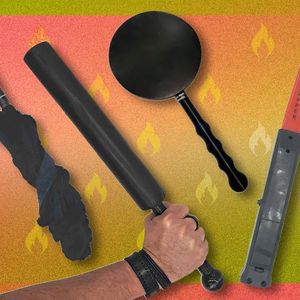CONTACTStaffCAREER OPPORTUNITIESADVERTISE WITH USPRIVACY POLICYPRIVACY PREFERENCESTERMS OF USELEGAL NOTICE
© 2024 Pride Publishing Inc.
All Rights reserved
All Rights reserved
By continuing to use our site, you agree to our Private Policy and Terms of Use.
Methamphetamine abusers in rural areas have more medical and psychiatric problems that may inhibit recovery than their urban counterparts, according to a new study that compares the two groups.
Experts say the findings are unsettling because rural addicts have limited access to treatment facilities and health professionals.
"Rural methamphetamine is worse in a lot of respects," said lead researcher Kathleen Grant, who works at the Omaha VA Medical Center and the University of Nebraska Medical Center.
Meth is an addictive stimulant that can be prepared or "cooked" in makeshift labs with over-the-counter cold tablets, common household chemicals, and fertilizers.
According to the 2004 National Survey on Drug Use and Health, about 11.7 million Americans ages 12 and older said they've tried methamphetamine, and 1.4 million said they'd used it in the past month.
The study, funded by the state of Nebraska, compared addicts from a 20,000-square-mile region who sought help at the nearest treatment facility in Grand Island with those living near and seeking help in the state's two largest cities, Omaha and Lincoln. In all, 172 meth abusers were interviewed between July 2004 and July 2005.
The study showed that rural addicts began using meth at a younger age, were more likely to use the drug intravenously, and were more likely to also be dependent on alcohol or cigarettes. They also exhibited more signs of psychosis than urban addicts--45% versus 29%, according to the study.
Grant said the findings, released in the March-April edition of The American Journal on Addictions, suggest rural addicts are at higher risk for psychiatric and medical problems such as infectious diseases and lung and liver cancer. That's troubling, she said, because addicts living in rural areas have less access to care--because of distance and transportation issues--than those living in cities.
"These people continue to slide into addiction and are not able to get the treatment they need," said Jennifer Sharpe Potter, an opiate specialist at Harvard University-affiliated McLean Hospital in Belmont, Mass.
She said meth addiction is difficult to treat because there are few treatment options available, and often the options that work best are not available in rural areas. That points to what she calls a long-standing problem that reaches beyond drug treatment: the availability of health care services in rural areas.
Recovering meth addict Barry Schmidt, 49, said he had to move from Fort Dodge, Iowa, to Omaha in order to get the help he needed to overcome a lifetime of drug and alcohol abuse. He left his wife and gave up seeing his father, who lives in a nursing home there.
"I changed my playground, playmates, and playthings," he said. It was difficult but something he said was necessary to get over his addictions.
Schmidt said he's been in treatment 19 times over the past 30 years, the first time when he was 19. His environment and a lack of recovery support were obstacles to staying clean, he said.
But things have been different in Omaha. Schmidt said he's graduated from the VA hospital's treatment program and attends six to seven recovery meetings a week. He credits those meetings and the people he meets there with his success so far. "I know that if I called any one of them at any given time and said I'm thinking of using and I'm in a bad place, they'd be there for me." (Timberly Ross, AP)
Want more breaking equality news & trending entertainment stories?
Check out our NEW 24/7 streaming service: the Advocate Channel!
Download the Advocate Channel App for your mobile phone and your favorite streaming device!
From our Sponsors
Most Popular
Here Are Our 2024 Election Predictions. Will They Come True?
November 07 2023 1:46 PM
17 Celebs Who Are Out & Proud of Their Trans & Nonbinary Kids
November 30 2023 10:41 AM
Here Are the 15 Most LGBTQ-Friendly Cities in the U.S.
November 01 2023 5:09 PM
Which State Is the Queerest? These Are the States With the Most LGBTQ+ People
December 11 2023 10:00 AM
These 27 Senate Hearing Room Gay Sex Jokes Are Truly Exquisite
December 17 2023 3:33 PM
30 Steamy Photos of Folsom Street Fair 2023 Debauchery
October 15 2023 11:06 PM
10 Cheeky and Homoerotic Photos From Bob Mizer's Nude Films
November 18 2023 10:05 PM
42 Flaming Hot Photos From 2024's Australian Firefighters Calendar
November 10 2023 6:08 PM
These Are the 5 States With the Smallest Percentage of LGBTQ+ People
December 13 2023 9:15 AM
Here are the 15 gayest travel destinations in the world: report
March 26 2024 9:23 AM
Watch Now: Advocate Channel
Trending Stories & News
For more news and videos on advocatechannel.com, click here.
Trending Stories & News
For more news and videos on advocatechannel.com, click here.
Latest Stories
How Beyoncé's Cowboy Carter advances equality
April 10 2024 1:39 PM
The North Face faces conservative boycott for sponsoring a queer summer camp (exclusive)
April 10 2024 8:26 AM
John Cena opens up about defending his gay brother when they were kids
April 09 2024 10:21 PM
Trans Latina Meraxes Medina killed in Los Angeles
April 09 2024 10:11 PM
Morgxn is proudly queering Southern music - here's how
April 09 2024 7:03 PM
Elon Musk uses burner accounts on X, doesn’t fact-check: report
April 09 2024 5:44 PM
Trending stories
Most Recent
Recommended Stories for You

















































































